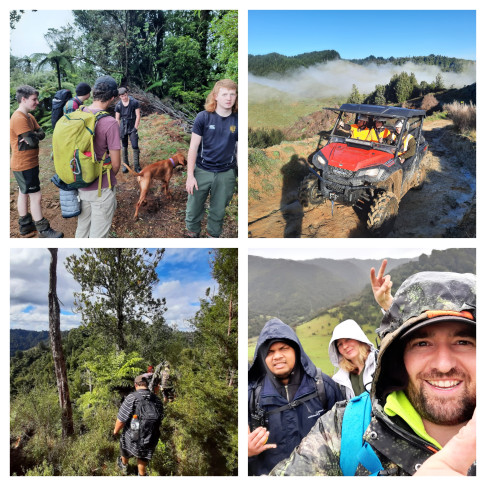Rats, rivers, rain, resilience - pest ops paradise
Josh Payne finished high school last year without a plan. Pretty soon he “got tired of being asked a million times – ‘what are you going to do?’” Then he remembered a presentation he’d seen about WITT’s pest operations Level 3 programme.
He enrolled in this year’s Semester One fees free intake and never looked back.
Josh is a keen hiker who’s always enjoyed being out in the bush. He tramped many tracks around Taranaki and Ruapehu maunga with his dad as a youngster.
Having just learned a bunch of skills that enable him to be out in nature for a job means he now has an answer to the earlier question.
“It’s real hands on, that’s what I really loved about it. You learn about what you’re going to do out in the field then go and do it,” says Josh, who started with an induction for a pest ops role on Mt Messenger this week (August 11).
“We learnt so much in such a short time – pest biology and behaviour, also trip planning and equipment. We also learn how to use GPS to mark up where the traps are and distance between them.”
Tutor Daniel Waterson trains students to be pest operators so they can contribute to Aotearoa becoming predator-free by 2050. Students learn trapping and techniques for controlling rats, stoats, ferrets and possums (some of our most destructive animal pests), as well as methods for controlling pest plants.
Traps, maps and apps
Josh particularly enjoyed using mapping programmes, such as Map Toaster – a topographical mapping app - to understand the terrain and to track where he’d been.
Many of the weekly field trips to do pest control around Taranaki maunga were in the cold, wet winter months. “The weather had to be pretty bad to call it off,” Josh says.
One of his favourite trips was in an area bordering the Taranaki Maunga national park for a 7.30am start. “It was raining the entire time. Days like that can be a real mental test. But you feel good at the end. It always feels good to push yourself – it’s such a rewarding feeling; to know you’ve done it.”
He credits tutor Daniel for injecting energy and excitement into the learning. “He’s good at keeping up morale on those long days. Often if it is getting near the end of a big day and the class is getting tired, he’ll share a joke, have a laugh and we all keep going.”
Josh appreciated the diverse age range and backgrounds of his classmates alongside new knowledge including risk management (how to avoid slips, trips and falls) when crossing a river, as well as being prepared with First Aid. The students also learn to drive an LUV (light utility vehicle), mastering engine breaking and manoeuvring on uneven terrain.

Caption: Daniel Waterson (bottom right) with students on pest ops field trips
Forest and farm
Josh lost count of the number of rats they caught. How did he deal with the dead ones? “At first it’s a bit yuk, then you just go ahead and do it.” (‘It’ being the removal and colloquially termed ‘aerial burial.’)
Measures to ensure traps don’t attract birds you are trying to protect are critical. His class discussed new ideas for trapping methods and designs – an area which is becoming more high-tech with the use of trail cameras, apps and digital devices.
Pest management isn’t just in native forest settings – it can be on farms, public gardens and urban reserves.
Josh hopes to see more of New Zealand through working in pest operations. “It’s what I want to do in life – travel and see as much as I can.”
Bush vs boardroom
Daniel, who’s been teaching the course for five years, says “the programme is perfectly suited to people who love being outdoors - the hunter, the hiker, the tramper. Anyone who would rather be out in the bush than in an office.”
Over the five years that the programme has been running, lots of graduates have got jobs in the conservation sector – and many tell him they’re now living their best lives.
“For me that’s hugely rewarding to see them fall on their feet, making a life for themselves, doing what they love doing.”
Others have enrolled in the programme with little understanding of what conservation is. “By the end of the semester, they shared how the whole experience was life changing for them,” Dan says.
He thinks his passion for the programme inspires others in what can be challenging work.
“More importantly our key industry stakeholders have opened their projects to share their own passion and knowledge, helping me to facilitate realistic conservation experiences. Without that support, the programme wouldn’t be half as good as it is today. I’m so proud to be teaching this programme at WITT and sharing this unique experience with our community. “
Find out more: New Zealand Certificate in Pest Operations (Level 3)
Caption: (Top) Josh Payne found his calling on the pest ops programme.